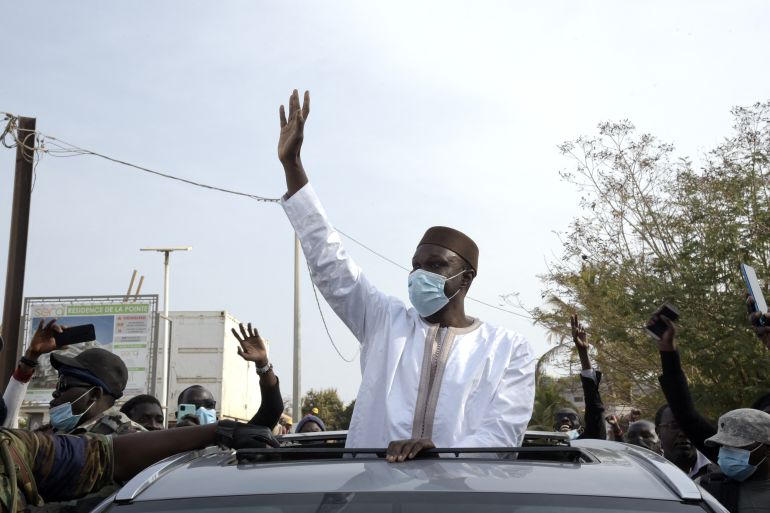Senegal opposition leader Ousmane Sonko to appear in court
Detained opposition leader to appear before a judge on Monday as his supporters urged to return to the streets.

Detained Senegalese opposition leader Ousmane Sonko is due to appear in court, as his supporters are urged to “massively descend onto the streets” for a new round of protests against his arrest.
Sonko, who was arrested after an employee of a beauty salon accused him of raping her, is due before the court in Dakar on Monday to answer questions about the rape charge, which he says is politically motivated.
Keep reading
list of 3 items‘Descend on streets’: Senegal opposition calls for mass protests
Pressure mounts on president as Senegal braces for fresh protests
Five people, including a schoolboy, have been killed in days of clashes sparked by the arrest, the worst violence in years in a country usually seen as a beacon of stability in a volatile region. Sonko, 46, enjoys wide support among the youth.
Schools in the capital have been ordered closed for a week, as the opposition called for three more days of protests beginning on Monday.
The education ministry said in a statement that it “strongly recommends that students’ parents keep a close eye on their children and keep them from the risks that come from the protests”.
The unrest has alarmed the United Nations and Senegal’s neighbours, who have appealed for all sides to show restraint, and President Macky Sall – yet to publicly address the situation – is facing mounting pressure to speak out.
Sonko, a fierce critic of the governing elite in Senegal, was arrested on Wednesday on charges of disturbing public order.
Scuffles between opposition supporters and security forces had broken out while Sonko was on his way to court in Dakar to answer the separate rape charge.
People torched cars, looted shops and hurled stones at police during the protests, which have highlighted longstanding grievances over living standards and economic exclusion in the West African state.
Clashes had abated by Saturday, but the call from the opposition to take to the streets again has led to concerns the violence could escalate.
Political pressure has mounted on President Sall, whose presidency has been plagued by accusations that he unjustly torpedoes political rivals and worries that he may seek to extend his rule beyond his allotted two-term limit.
The economic devastation caused by the COVID-19 pandemic and a nightly curfew to contain its spread have only stoked frustrations.
Ahead of the new protests, 19 foreign embassies in Dakar issued a joint statement on Sunday urging non-violence and dialogue.
The 15-nation Economic Community of West African States also called for a peaceful solution to tensions, noting that it had “significant concerns”.
Tight security
Al Jazeera’s Nicolas Haque reporting from the capital, Dakar, said security was tight in anticipation of protesters taking to the streets.
“Security forces have … have set up road blocks,” Haque said.
“Earlier, we saw the military’s been deployed and patrolling the streets of the capital. Very unusual scenes for this country, which has enjoyed political stability for decades. The military is there to dissuade protesters from taking to the streets,” he added.
Meanwhile, the protest leaders told Al Jazeera they will continue with the demonstrations until the government listens to their demands.
“Our democracy is in danger. The government has incarcerated large number of young people and the opposition leader without any grounds,” Yassine Fall, a founding member of the Movement to Protect Democracy, told Al Jazeera.
“The government took on a private matter and made it a public and political matter. And we feel our democracy is at stake. Senegal is a peaceful country, we cannot let that happen,” Fall added.